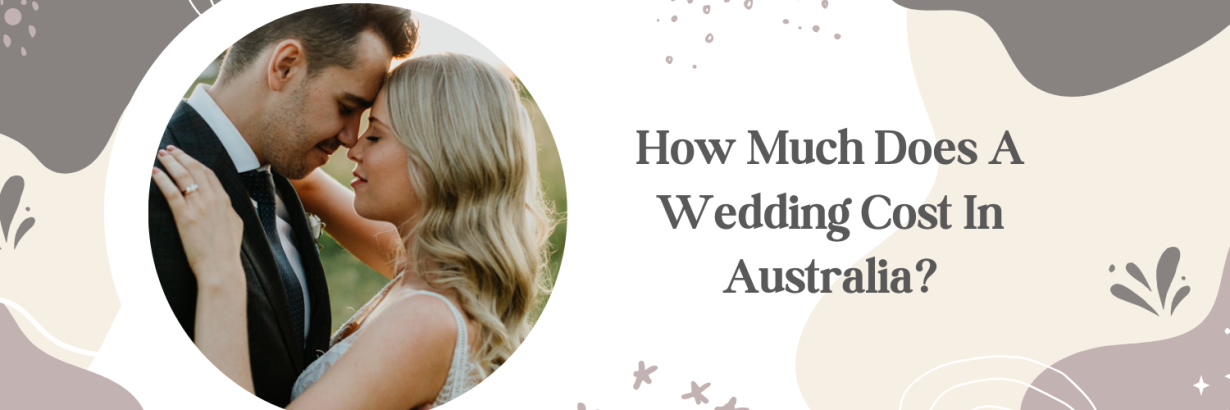
How Much Does A Wedding Cost in Australia
Weddings in Australia
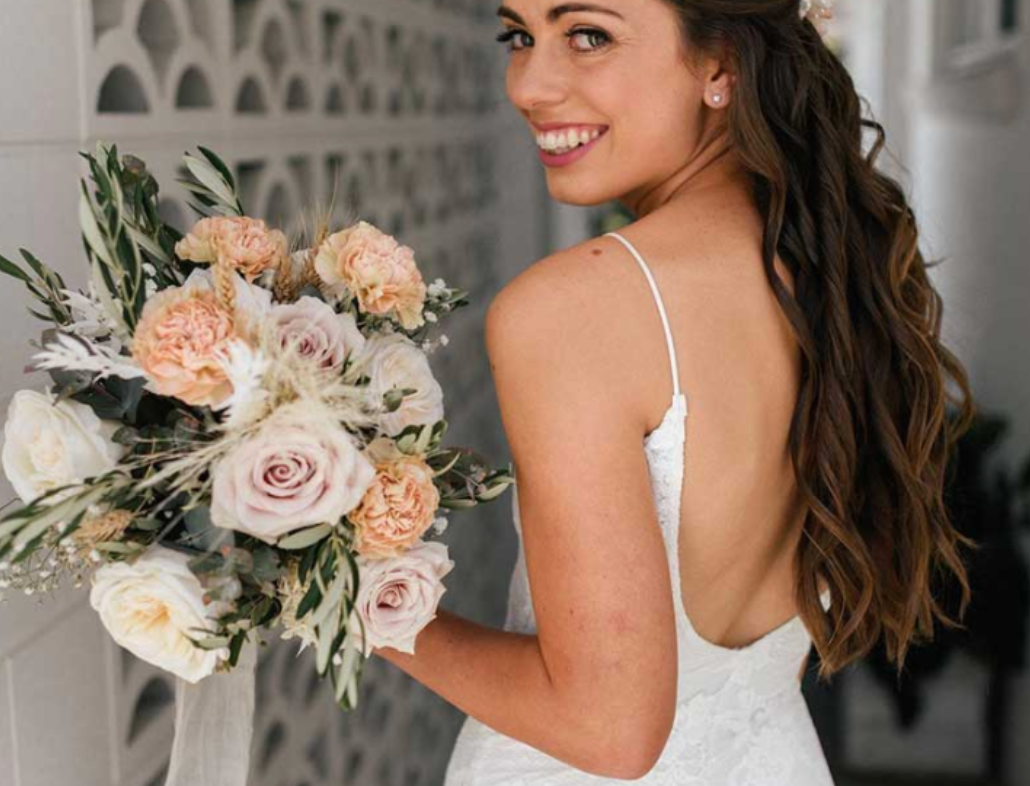
The Average Cost of a Wedding in Australia
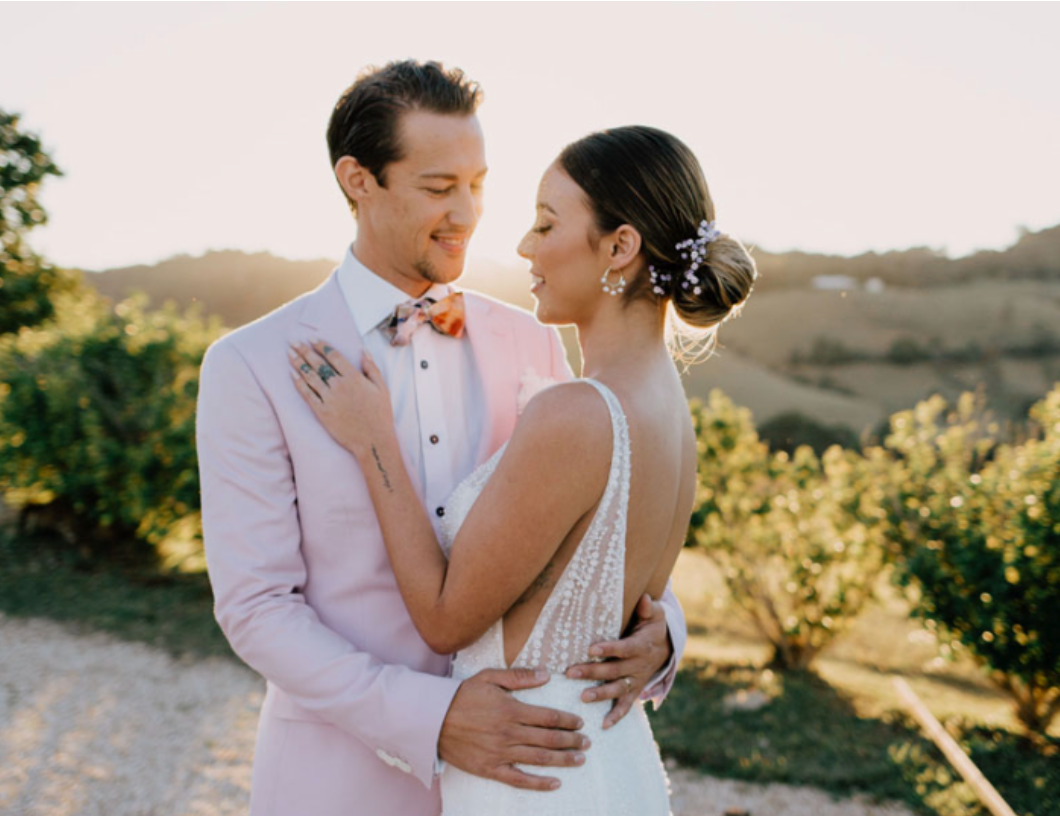
When planning a wedding in Australia, one of the first questions that couples often grapple with is the cost. Understanding the average expenses in orchestrating such an event is crucial for effective planning and budget management. Recent data indicates that the average price of a wedding in Australia can vary significantly, influenced by a myriad of factors, including location, size, and the level of extravagance desired by the couple.
- National Average Costs: On average, couples in Australia might spend anywhere from $34,715 on their wedding. This figure provides a baseline, but it’s important to remember that each wedding is unique, with costs fluctuating based on personal choices and priorities.
- City-Specific Costs: In metropolitan areas like Sydney and Melbourne, the average cost tends to be higher, often reflecting the premium paid for venues in prime locations, top-tier service providers, and the higher cost of living. In these cities, couples might spend at the higher end of the average range or beyond.
- Regional Variations: Conversely, the average cost can be significantly lower in smaller cities or regional areas. Places like Brisbane, Adelaide, or rural towns offer various venue options at more affordable rates. The reduced cost doesn’t necessarily mean a compromise in quality; many regional areas boast stunning landscapes and top-notch services in larger cities at a fraction of the price.
- Individual Preferences: The scale and style of the wedding also play a critical role in determining the overall cost. A lavish celebration with hundreds of guests, gourmet catering, and elaborate decor will naturally cost more than a smaller, more intimate gathering. The choice of attire, entertainment, photography, and additional elements like transportation and accommodation for guests also add to the total expense.
- Flexibility and Seasonality: The time of year and day of the week chosen for the wedding can also impact costs. Due to higher demand, peak wedding seasons and weekend dates are typically more expensive. Couples willing to be flexible with their dates might find that off-peak times offer more budget-friendly options.
Breakdown of Wedding Expenses

Planning a wedding in Australia involves navigating a variety of costs. Understanding where your money will likely go can help you set a realistic budget and make informed decisions. Here’s a detailed breakdown of typical wedding expenses:
- Venue Hire: The venue is often one of the most significant expenses. Costs vary widely depending on location, size, and popularity. Exclusive venues in major cities can command high prices, while regional venues might offer more affordable rates. Some venues offer package deals that include catering, decorations, and other services.
- Catering: Food and drink are another significant expense, with costs depending on the type of catering (sit-down meal, buffet, cocktail reception) and the number of guests. Some venues require you to use their in-house catering, while others allow external caterers.
- Attire: The wedding dress is a significant expense for many brides, with varying prices depending on the designer, fabric, and style. Clothing, including suits or tuxedos, also adds to the budget. Don’t forget to account for alterations, accessories, and beauty treatments like hair and makeup.
- Photography and Videography: Capturing the day is essential, with professional photographers and videographers varying prices based on their experience and the packages they offer. Packages can include pre-wedding shoots, full-day coverage, albums, and digital copies of images and videos.
- Decor and Flowers: The cost of decorations and floral arrangements can quickly add up. This includes venue decorations, bouquets, boutonnieres, centrepieces, and other floral decor. Prices vary based on the types and quantities of flowers and the complexity of the arrangements.
- Entertainment: Hiring a band, DJ, or other forms of entertainment for the reception is an ordinary expense. Costs depend on the reputation and experience of the entertainers and the length of their performance.
- Wedding Rings: The cost of wedding bands is a critical consideration, with prices depending on the metal, design, and any gemstones used.
- Stationery: Invitations, save-the-dates, menus, place cards, and thank-you notes must also be budgeted. Costs vary based on the design, printing technique, and quantity.
- Transport: Hiring cars or other transport for the wedding party and possibly guests, especially if the ceremony and reception are at different locations, can add to the budget.
- Miscellaneous Expenses: Don’t forget to account for additional costs like marriage license fees, bridal party gifts, and pre-wedding events like rehearsals.
Factors Influencing the Cost of Your Wedding

Various factors can significantly influence the overall cost when planning a wedding in Australia. Understanding these variables can help you make choices that align with your budget and preferences.
Size and Location
- Guest Count: The number of guests primarily affects the cost. More guests mean higher catering costs, larger venues, and increased expenses for invitations, favours, and rentals. Opting for an intimate wedding with fewer guests can substantially reduce the cost.
- Venue Location: The location of your wedding plays a significant role in determining the budget. Urban venues like Sydney or Melbourne are typically more expensive than rural or regional locations. Additionally, destination weddings may incur extra travel and accommodation expenses.
Style and Theme
- Wedding Style: The style of your wedding — whether it’s a formal black-tie affair or a casual beach ceremony dramatically impacts the cost. Formal weddings often involve more elaborate venues, gourmet catering, and sophisticated decor, whereas relaxed, simple weddings can be more economical.
- Theme and Decor: The chosen theme influences the type and amount of decor, which can affect the budget. A minimalist or natural theme might require less decor than a lavish, opulent theme. DIY elements can also help in reducing costs.
Season and Timing
- Seasonal Pricing: The time of year you choose to get married can affect costs. Peak wedding seasons, typically spring and autumn in Australia, often have higher venue and vendor prices due to increased demand. Conversely, matching in off-peak seasons like winter might offer more competitive rates.
- Day of the Week: Weekend weddings, especially Saturdays, are the most popular and thus the most expensive. A weekday wedding can significantly save venues and vendors, as they are less in demand.
Personalising Your Budget
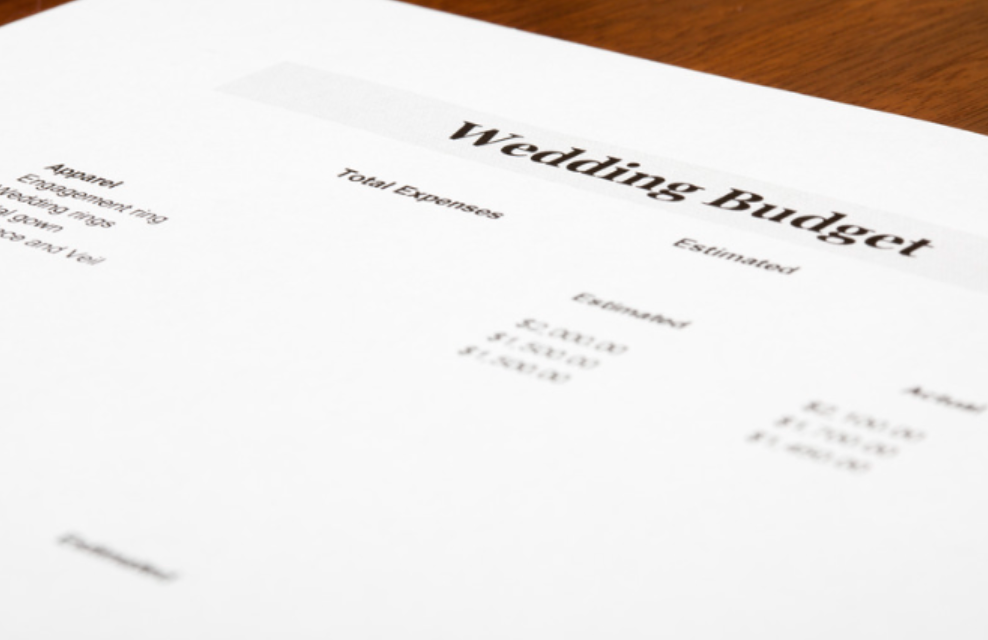
Identify Your Priorities
- Begin by discussing with your partner what elements of the wedding are most important. Is it the venue, the photography, the food, or the entertainment? Maybe you value a stunning dress or suit more than elaborate decorations.
- Once you’ve identified these priorities, allocate a more significant portion of your budget to them. This ensures you’re spending on what truly matters to you while being more economical in other areas.
Consider Cost-Effective Alternatives
- Look for budget-friendly alternatives for aspects that are lower on your priority list. For instance, digital invitations can be a modern and cheaper alternative to traditional printed ones.
- If a large bridal party seems too costly, consider having fewer attendants. This can save on attire, gifts, and potentially transportation and accommodation.
Flexible Venue Options
- Instead of a lavish venue, consider more affordable options like community halls, outdoor parks, or even a backyard wedding. These can offer significant savings and a more personal touch.
- Some venues offer reduced rates for off-peak dates or weekdays. If your schedule allows, taking advantage of these lower rates can make a big difference in your budget.
DIY Where Possible
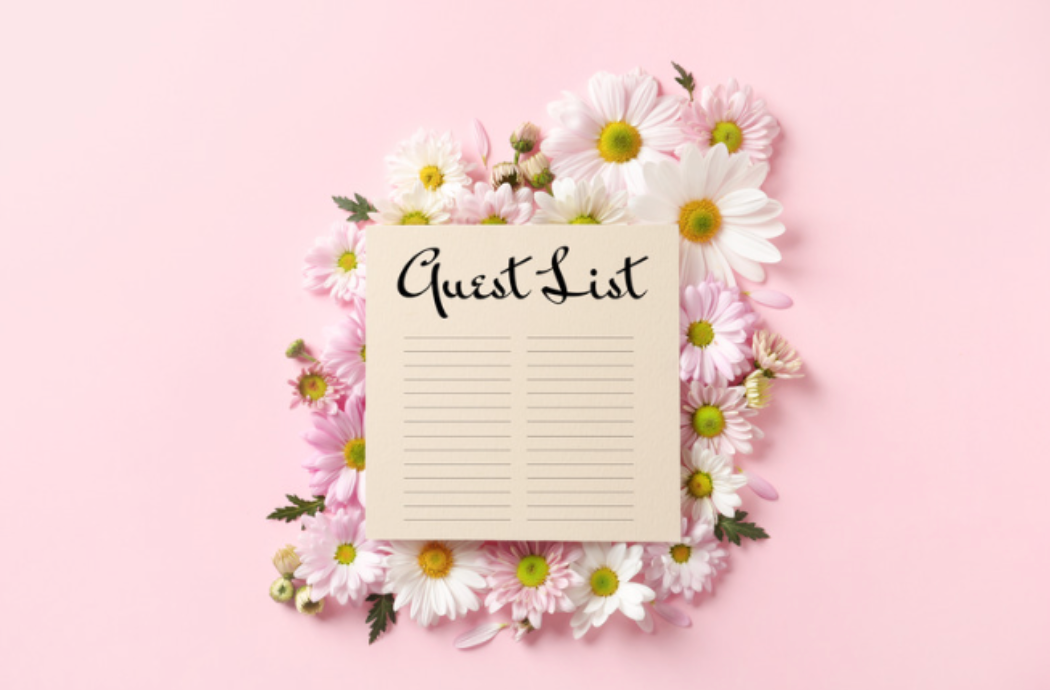
Manage Guest List Size
- A smaller guest list can significantly reduce costs. Intimate weddings are not only more affordable but can also be more personal and memorable.
Photography and Videography
- Invest in a good photographer or videographer if capturing your day is a top priority. If it’s less of a concern, consider packages offering fewer hours of coverage or look for emerging talent offering more competitive rates.
Saving Strategies for Your Big Day
A wedding is a significant financial commitment, but numerous strategies exist to control costs while still creating a memorable day. Here are some practical saving tips for your wedding:

DIY Projects
- Decorations: Consider taking on some DIY projects for your wedding decorations. Handcrafted centrepieces, signage, and table settings add a personal touch and can be much more cost-effective than store-bought or professionally made items.
- Favours: DIY wedding favours are budget-friendly and allow for a personalised gift to your guests. Simple ideas include homemade treats, seed packets, or personalised notes.
Vendor Negotiation
- Customised Packages: Many vendors are open to negotiation and can customise their packages to fit your budget. Don’t be afraid to discuss your financial constraints; they may offer alternatives that align with your budget.
- Comparative Shopping: Get quotes from multiple vendors before making a decision. This gives you a sense of the market rate and provides leverage when negotiating prices.

- Tracking Tools: Utilise budgeting tools or apps designed for weddings to keep track of all your expenses. These tools can help monitor your spending and alert you if you’re approaching your budget limits.
- Prioritise Spending: Continuously revisit your budget and prioritise spending on items most vital to you. Being mindful of where your money is going can help prevent unnecessary expenditures.
Additional Cost-Saving Tips
- Off-Peak Discounts: Consider having your wedding during off-peak times. Many venues and vendors offer discounts for weddings during the week, in the morning, or during less popular months.
- Limit Guest List: Reducing the number of guests is one of the most effective ways to lower costs. A smaller, more intimate wedding can save money on catering, invitations, and venue size.
- Alternative Catering Options: Instead of a traditional sit-down dinner, consider other catering styles like buffets and food trucks for a potluck-style meal for a very intimate wedding.
- Borrow or Rent: Borrow items from friends or family or consider renting. Things like decorations, accessories, or even wedding attire can be rented at a fraction of the purchase price.
Real Wedding Stories
Story of Emma and Liam – A Beachfront Bargain
- Location: Emma and Liam chose a stunning beachfront in Queensland for their wedding. By selecting a public beach, they saved significantly on venue costs.
- Budget Strategy: They opted for a local seafood restaurant for the reception, which offered a discount for large groups and brought a local charm to the event.
- DIY Elements: Emma crafted a hen bouquet from Wildflow, and they used recycled timber for beach-themed decorations, adding a personal touch without the high cost.
- Insight: “Our wedding was about our love for each other and the beach. We saved a lot by choosing a public space and focusing on what mattered to us,” shares Emma.
Story of Aiden and Zoe – Urban Elegance on a Budget
- Location: In the heart of Melbourne, Aiden and Zoe found a quaint art gallery that doubled as a wedding venue, offering a unique space at a lower cost than traditional venues.
- Vendor Negotiations: They negotiated with vendors for a mid-week wedding, gaining discounts on photography and catering.
- Guest List: Keeping the guest list to close friends and family made the day more intimate and helped keep costs manageable.
- Insight: Zoe says, “We learned that mid-week weddings aren’t just affordable, they’re also wonderfully intimate. Negotiating with vendors paid off.”
Story of Hannah and Ben – Rustic Charm in the Countryside
- Location: Opting for a rustic barn in a regional area, they found that rural venues offered more inclusive packages.
- Seasonal Timing: A winter wedding meant less competition for dates and more leverage in price negotiations.
- DIY Decor: Ben’s woodworking skills came in handy for creating custom signage and decorations.
- Insight: “Our countryside winter wedding was not only dreamy but also budget-friendly. The off-peak season was a major cost saver,” explains Hannah.
Story of Jack and Sarah – Elegant Affair with Smart Savings
- Location: Choosing a well-known venue in Sydney, they capitalised on a package deal that included catering, decorations, and a DJ.
- Photography: Instead of a high-priced photographer, they hired a talenthy student who offered a competitive rate.
- Second-Hand Finds: Sarah found her dream designer dress at a fraction of the cost through a second-hand boutique.
- Insight: “We splurged on the venue but saved on other aspects. It’s all about finding the right balance,” Jack notes.
Choose Tina Kristen Weddings for Hair and Makeup
For those looking to add a touch of elegance and beauty to their wedding day,
Tina Kristen Weddings offers exceptional wedding makeup services tailored to your unique style and preferences. Our team of professional makeup artists specialises in creating flawless, lasting looks that will enhance your natural beauty and complement the overall theme of your wedding. We’ll ensure you look and feel your absolute best as you celebrate this momentous occasion.
Reach out to us today.
FAQs
Q: What Is the Most Expensive Part of a Wedding in Australia?
Typically, the venue and catering are the most expensive parts of a wedding in Australia. The cost can vary widely depending on the location, the size of the guest list, and the type of catering chosen. Luxury venues in major cities and high-end catering options can significantly increase these costs.
Q: Can I Have a Beautiful Wedding on a Tight Budget in Australia?
Absolutely. A beautiful wedding is not solely defined by how much you spend. By prioritising what’s important to you, opting for cost-effective alternatives like DIY decorations, choosing an off-peak season for your wedding, and carefully managing your guest list, you can create a memorable and beautiful wedding within a tight budget.
Q: How Far in Advance Should I Start Saving for a Wedding?
It’s advisable to start saving for your wedding as soon as possible, ideally when considering marriage. A typical recommendation is to keep at least 12 to 18 months in advance. This gives you ample time to accumulate funds and make early bookings, which can sometimes secure better rates.
Q: Are There Any Hidden Costs I Should Be Aware of When Planning a Wedding?
Yes, weddings often come with hidden costs. These can include service feevendor gratuitiesors, taxes, postage for invitations, dress alterations, and additional décor or equipment rentals. Reading contracts thoroughly and asking vendors about other applicable fees is essential.
Q: How Can I Effectively Negotiate With Wedding Vendors?
To negotiate effectively with wedding vendors, do your research to understand the average cost, and be clear about your budget constraints. Be respectful and flexible — vendors are more likely to accommodate your needs if you compromise. Also, consider what you can offer them, such as referrals or flexibility in timing, which may incentivise them to give you a better deal. Remember, getting any agreements in writing is essential to avoid misunderstandings later.
